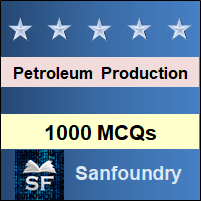
Petroleum Production Operations Multiple Choice Questions Highlights
- 1000+ Multiple Choice Questions & Answers (MCQs) in Petroleum Production Operations with a detailed explanation of every question.- These MCQs cover theoretical concepts, true-false(T/F) statements, fill-in-the-blanks and match the following style statements.
- These MCQs also cover numericals as well as diagram oriented MCQs.
- These MCQs are organized chapterwise and each Chapter is futher organized topicwise.
- Every MCQ set focuses on a specific topic of a given Chapter in Petroleum Production Operations Subject.
Who should Practice Petroleum Production Operations MCQs?
– Students who are preparing for college tests and exams such as mid-term tests and semester tests on Petroleum Production Operations.- Students who are preparing for Online/Offline Tests/Contests in Petroleum Production Operations.
– Students who wish to sharpen their knowledge of Petroleum Production Operations Subject.
- Anyone preparing for Aptitude test in Petroleum Production Operations.
- Anyone preparing for interviews (campus/off-campus interviews, walk-in interview and company interviews).
- Anyone preparing for entrance examinations and other competitive examinations.
- All - Experienced, Freshers and College / School Students.
Petroleum Production Operations Chapters
Here's the list of chapters on the "Petroleum Production Operations" subject covering 100+ topics. You can practice the MCQs chapter by chapter starting from the 1st chapter or you can jump to any chapter of your choice.- Geologic Considerations in Producing Operations
- Reservoir Considerations in Well Completions
- Well Testing
- Primary Cementing
- Well Completion Design
- Completion Equipment
- Perforating
- Completion and Workover Fluids
- Tubing Production Logging
- Problem Well Analysis
- Paraffins and Asphaltenes
- Squeeze Cementing
- Sand Control
- Formation Damage
- Surfactants for Well Treatments
- Acidizing
- Hydraulic Fracturing
- Scale Deposition, Removal and Prevention
- Corrosion Control, Workover and Rigs Workover Systems
- Workover Planning
1. Geologic Considerations in Producing Operations
The section contains multiple choice questions and answers on oil and gas habitat, reservoir rocks fractures and joints, sandstone reservoirs, geologic factors in sandstone reservoirs and geologic applications in carbonate reservoirs.
2. Reservoir Considerations in Well Completions
The section contains questions and answers on oil and gas hydrocarbon properties, reservoir rocks characteristics and fluid flow, reservoir drive mechanisms and reservoir characteristics effects on well completions.
|
|
|
3. Well Testing
The section contains MCQs on productivity or deliverability tests, transient pressure tests, drill stem testing and obtaining good test data recommendations.
|
|
|
4. Primary Cementing
The section contains multiple choice questions and answers on cementing materials, cement additives and bonding, primary cements flow properties and displacement mechanics.
|
|
|
5. Well Completion Design
The section contains questions and answers on well completion design concepts, conventional and unconventional tubular configurations.
|
|
|
6. Completion Equipment
The section contains MCQs on production tubing, corrosion, packers, pressure effects and temperature changes, subsurface control and wellhead equipments.
|
|
|
7. Perforating
The section contains multiple choice questions and answers on perforating oil and gas wells, perforators types and performance evaluation, perforating results factors, fluids, pressure differential and formation properties.
|
|
|
8. Completion and Workover Fluids
The section contains questions and answers on function requirements selection, formation damage, oil and clear water fluids practical applicatiomns, conventional water based mud, invert emulsion mud, well killing, perforating fluids and packer fluids.
9. Tubing Production Logging
The section contains MCQs on logging devices, tubing production logging application, production logging techniques field examples and primary cement evaluation.
|
|
|
10. Problem Well Analysis
The section contains multiple choice questions and answers on problem wells and problems with artificial lift wells.
|
|
|
11. Paraffins and Asphaltenes
The section contains questions and answers on paraffin and asphaltene chemistry, deposition mechanisms, wax deposits removal, wax control design and wax deposition prevention.
|
|
|
12. Squeeze Cementing
The section contains MCQs on squeeze cementing theoretical and practical considerations, special squeeze cementing situations, squezze cement job planning, normal and other operational procedures.
|
|
|
13. Sand Control
The section contains multiple choice questions and answers on sand control basics and mechanical methods, drag forces reduction, gravel packing practical considerations, resin consolidation and sand control methods.
14. Formation Damage
The section contains questions and answers on formation damage basics, damage causes, damage mechanisms classification, formation clays, asphaltene plugging and mathematical expressions.
|
|
|
15. Surfactants for Well Treatments
The section contains MCQs on surfactants characteristics, surfactants use and action, formation damage, preventing or removing damage, well stimulation with surfactants, rod pumping effectiveness and well damge prevention.
16. Acidizing
The section contains multiple choice questions and answers on well simulation acids, acid additives, carbonate, acidizing techniques for carbonate formations, sandstone acidizing and acidizing safety hazards.
|
|
|
17. Hydraulic Fracturing
The section contains questions and answers on hydraulic fracturing basics and mechanisms, fracture propping, frac fluids, frac job design and evaluation techniques.
|
|
|
18. Scale Deposition, Removal and Prevention
The section contains MCQs on scale deposition and its causes, scale prediction and identification, scale removal and prevention.
|
|
|
19. Corrosion Control, Workover and Rigs Workover Systems
The section contains multiple choice questions and answers on corrosion process, corrosion detection and measurement, conventional production rigs and non-conventional workover systems.
|
|
|
20. Workover Planning
The section contains questions and answers on workover reasons, workover to alleviate formation damage and watr production reduction in gas and oil wells, sand controls, zones or reservoirs, workover to complete and increase production in wells with high viscosity oil.
Wish you the best in your endeavor to learn and master Petroleum Production Operations!
